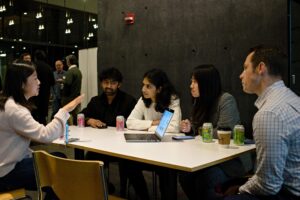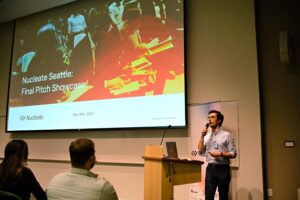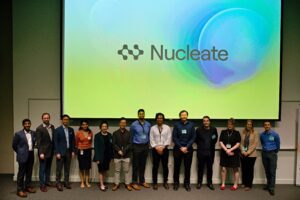Transitioning from academia to industry is no small feat. Despite recognizing the barriers for budding academic researchers to break into the start-up world, Dante Dennis Acenas II understands the drive to push scientific findings into the market. As a PhD candidate in the Dudakov Lab at Fred Hutch, Acenas says he has the rare benefit of a business-minded PI who thinks outside of just the academic publishing route, seeing commercializing as a catalyst to help people faster. This pushed Acenas to become what he calls a “well-rounded scientist” who sees beyond the bench and now splits his time nurturing both his research and business interests through an organization called Nucleate.
 Initially founded in Boston, Nucleate is a student-led nonprofit activator that facilitates the formation of life science companies within academic institutions. Nucleate aims to lower barriers for the next generation of bio-innovators by providing education, mentorship, and specialized support. After first encountering Nucleate in early 2022, Acenas played a pivotal role in their westward expansion as the Co-Managing Director of the Seattle Chapter. Now in Nucleate Seattle’s second year, Acenas hopes to attract talent to the program from across the Pacific Northwest.
Initially founded in Boston, Nucleate is a student-led nonprofit activator that facilitates the formation of life science companies within academic institutions. Nucleate aims to lower barriers for the next generation of bio-innovators by providing education, mentorship, and specialized support. After first encountering Nucleate in early 2022, Acenas played a pivotal role in their westward expansion as the Co-Managing Director of the Seattle Chapter. Now in Nucleate Seattle’s second year, Acenas hopes to attract talent to the program from across the Pacific Northwest.
In this Q&A with Science in Seattle, Acenas talks about what makes Nucleate different from other programs, the challenges of entrepreneurship as a researcher, and how to get involved.
Can you give a brief overview of the Nucleate program?
The program can be broken down into four steps. First is the formation stage, where we bring everyone together, including stakeholders like clinicians and researchers and business-oriented people such as MBA students. We have facilitated team formation events, which is like speed dating for start-ups, so everyone can meet and decide who is a good fit. We then pair the teams up with mentors for strategic support and expert advice.
 After team formation and mentorship matching, we move into the education stage. All of the activator teams are enrolled in multiple workshops covering different topics. This helps them answer key questions like Is the science sound? Does it make sense? Is it backed by multiple studies? How does the market look? Do you have a competitive edge against more established companies out there?
After team formation and mentorship matching, we move into the education stage. All of the activator teams are enrolled in multiple workshops covering different topics. This helps them answer key questions like Is the science sound? Does it make sense? Is it backed by multiple studies? How does the market look? Do you have a competitive edge against more established companies out there?
Lastly, we have our final pitch day where all of the teams debut their concept in front of the our local biotech community. After they leave Nucleate, we also organize global summits, where we bring both leadership and activator participants together. This allows us to build community, share stories, and foster networks.
What do you think is the strongest pillar of the program?
Our workshops are tailored. They’re not standard workshops that people typically go to where one person is speaking to 100 people. They’re a one-on-one interaction. Our teams don’t need to compete for time or attention.
”Nucleate is, in essence, like a happy marriage between my two biggest interests professionally: business and science. I don't want to focus solely on the bench because I think there are so many things beyond science that students should get involved in. I’m lucky that I stumbled upon Nucleate.
What do you look for in mentors?
First, we like to identify people within the local industry who have the necessary background and expertise to fit the team’s needs. Second, as a nonprofit reliant on volunteers, we look for folks willing to donate their time.
Third, from an equity standpoint, we like to make sure that the teams are meeting with a diverse set of professionals and mentors, which can be empowering for our new leaders.
What other ways does Nucleate prioritize DEI within the structure of the program?
In addition to a balanced leadership team, we also include a diversity of backgrounds in our participant pool. We have specific programs geared towards empowering women within the field. For example, within the next couple of months, we plan to host Nucleate Seattle Women Leadership Dinners where participants meet with more established women leaders within the field in a casual setting. Currently, the industry is very male-dominated and our goal is to make sure women leaders and other folks with different orientations feel empowered and are given the spotlight.
 Eventually, as more individuals join the programs, we can inspire a diverse group of people at the beginning of their journeys. That’s really important to me as a first-generation immigrant from the Philippines. I don’t meet a lot of Filipino graduate students and I’ve only met one professor, so I know firsthand how key representation can be when inspiring the next generation. I’m glad that within the Seattle Community, there are a lot of others thinking along the same lines and supporting these endeavors.
Eventually, as more individuals join the programs, we can inspire a diverse group of people at the beginning of their journeys. That’s really important to me as a first-generation immigrant from the Philippines. I don’t meet a lot of Filipino graduate students and I’ve only met one professor, so I know firsthand how key representation can be when inspiring the next generation. I’m glad that within the Seattle Community, there are a lot of others thinking along the same lines and supporting these endeavors.
Beyond funding and buy-in, what are some essential skills for someone wanting to create a start-up?
I don’t know if this is a skill that can be taught, but I’d say grit; the ability to keep going. In entrepreneurship, failure is basically a requirement before you get to your next big thing.
Another crucial skill is the ability to ask for help. I noticed within the academic system, for the most part, everyone is very isolated. When a problem arises, the first instinct is to ask, “How can I figure this out myself?”. But in business, you need to have a mindset shift. Instead of trying to figure it out yourself and wasting time starting from scratch, ask who can I reach out to that could help me.
Lastly—and I don’t know if this a teachable skill—is foresight. Being able to accurately predict how things are going to happen or at least plan multiple steps in advance is invaluable.
 What makes Nucleate different from other activator programs?
What makes Nucleate different from other activator programs?
We’re completely student-led, which is rare. I think this is our strength because students know what students want and need. We’re right on the ground with them and it’s very rewarding to be there, supporting our colleagues through their journey.
We also lower the activation energy for people starting up by including a team formation stage and having a low-stakes testing ground for people to get feedback on their ideas.
What should people looking to get into the next activator cycle start thinking about now?
There are a few ways to get involved—either as a founder, a scientific contributor, or a business contributor. If they want to go the founder route, they should start thinking about ideas to commercialize or interesting findings they’ve encountered. If they want to come in as a contributor, it would be good to consider what kind of modality they’d like to get involved in—whether that be a clinical application, a medical device, or a therapeutic or diagnostic start-up. Once they know that, they can consider what skills they have expertise in to help with success.
 Nucleate Seattle will be accepting applications and forming new teams in the fall of 2024. If you’d like to get involved sooner, the Final Pitch Showcase is taking place this May in Seattle. You can find more information on their website.
Nucleate Seattle will be accepting applications and forming new teams in the fall of 2024. If you’d like to get involved sooner, the Final Pitch Showcase is taking place this May in Seattle. You can find more information on their website.
This interview has been edited for brevity and clarity.

